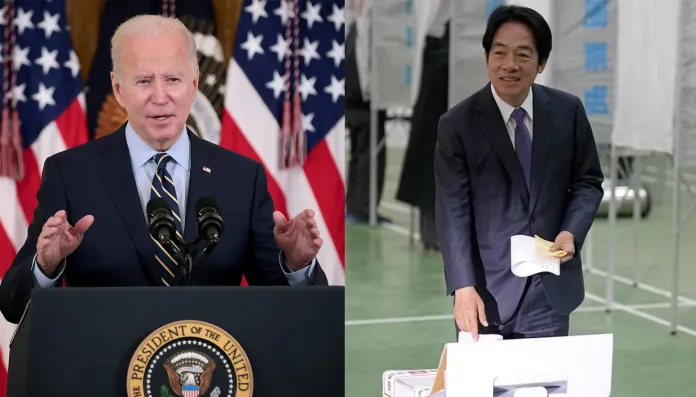After voters in Taiwan rejected China and awarded the governing party a third term in office, US President Joe Biden declared on Saturday that the US does not support Taiwan’s independence.
Earlier in the day, Lai Ching-te, the presidential candidate of the governing Democratic Progressive Party (DPP) in Taiwan, emerged victorious, vehemently rejecting Chinese attempts to oust him, and promising to both defy Beijing and pursue dialogue.
When questioned about his thoughts on Saturday’s elections, Biden responded, “We do not support independence…”
The United States has long maintained that it opposes Taiwan issuing a formal declaration of independence, having moved its diplomatic recognition from Taipei to Beijing in 1979. Nonetheless, it continues to have informal ties with the self-governing island and is still its biggest supporter.
Beijing believes that Lai may announce the foundation of a Republic of Taiwan, which he has stated he will not do. Beijing has never abandoned the use of force to bring Taiwan under its rule.
Biden’s remarks that seemed to stray from the long-standing American stance of “strategic ambiguity” and imply that the United States would defend the island in the event of an assault had infuriated the Chinese leadership.
It seems like he was trying to reassure Beijing with his remarks on Saturday.
Nevertheless, Washington issued a warning only a few hours before polls opened, stating that “any” nation interfering in the election “would be unacceptable.”
Since hosting its first direct presidential election in 1996—the result of decades of struggle against authoritarian government and martial law—Taiwan, which borders China, has been a democratic success story.
Congratulations congratulating Lai Ching-te on his victory, U.S. Secretary of State Antony Blinken declared that the country “is committed to maintaining cross-strait peace and stability, and the peaceful resolution of differences, free from coercion and pressure.”
According to him, the United States is eager to collaborate with Lai and Taiwan’s political leaders to further their “longstanding unofficial relationship, consistent with the U.S. one China policy.”
The Biden administration was concerned that tensions with Beijing would worsen as a result of the election, transition, and new government.
In an effort to improve ties with China, Biden has agreed to resolve security-related disagreements with President Xi Jinping during a November visit in California.
According to two senior government officials, Taiwan anticipates that China would try to exert pressure on its future president following the vote by, among other things, holding military drills close to the island this spring. China has never denied the right to use force to annex Taiwan.
According to a senior Biden administration source, Biden intends to send an unofficial delegation to the self-governing island as a show of support for the government.
The person said the names are still being finalised, but it is probable that some former high-ranking American officials would be in the trip. Comparable delegations have been dispatched.

